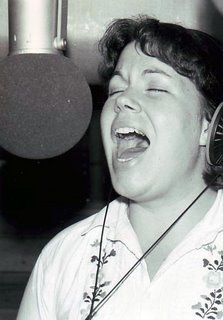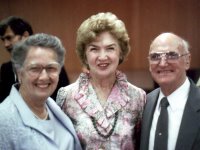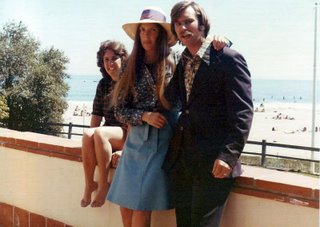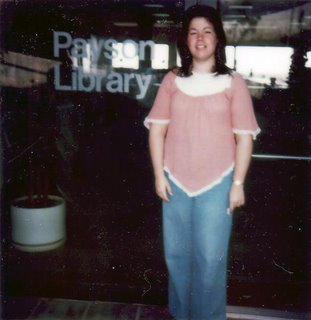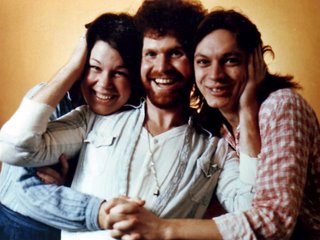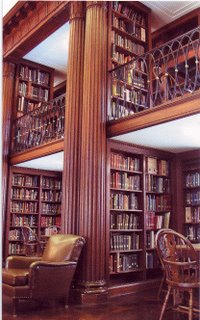Now that I was back in the “Buckle on the Bible Belt,” I had figured that I would return to my old ways, showing up at church every chance I got. But I had changed, and times had changed, in the passage of only one year. Now I was a student at Vanderbilt Divinity School (which I’m sad to say I despised, judging it inferior in comparison with Yale), working and living at the Hospital Hospitality House, singing late nights in the studio, and somehow additionally carrying on a new friendship with Marty McCall. Not too much time left over for church. I didn’t know yet to be on the lookout for my extremist tendencies, so I overreacted to my immersion in the life of the mind the previous year and turned now to the life of the emotions, with a heavy emphasis on relationships.
I wrote an essay for a class at Vanderbilt. This isn’t the final version, which I can’t locate, but an initial draft. It’s definitely revealing of “where I was at” regarding my spiritual life. My brief time at Yale had left its mark on my language and my thinking, as is apparent.
“What is it about ‘low church’ worship that is so discordant and irritating, if not merely disappointing? Is it not the inappropriate moments of banality, the intrusion of commonplace concerns and emotions into the realm of what we sense as numinous, holy, awesome? I will never forget my first conscious response to the low church mentality, when at summer camp there was a night-time baptism, and almost before the hymn with words of rejoicing and praise had ceased, the camp director announced that the hot chocolate was ready. Not even a moment of silence marked a reverence for the new birth that had just been accomplished. An extended period of exultation would have been as foreign to that gathering as would a coped and mitered bishop and a marble baptismal font. I have since forgiven the camp director, but the impression made on my worshiping consciousness that night has been deepened by layers of repeatedly incongruous business-as-usual responses to the presence of the holy.
“As I continued along a semi-conscious path toward spiritual integrity, I found myself seeking the fellowship of people for whom worship was not only a vital experience, but for whom that experience was not embarrassing. I sought people who were capable of discussing their response to the Word of God, rather than the dynamism of the preacher or lack thereof; to the love of the Lord, rather than the beauty of the singing or the building or the day. People with whom, though it might be difficult, it was important and possible to communicate awe, and gratitude, and excitement, and acceptance, and — blessedness — in the presence of God. People who knew how to demonstrate their awareness of the shocking reality of worship, of exhortation from the Word of God, of being with one another before Him.
“I went to the ‘high’ churches and found: a respect for ritual and mystery, dignity, and infinite sensitivity to ‘taste’ and appropriateness. I found an awareness of the power of drama, music, visual arts and poetry, to communicate to more than the intellect, to involve the whole person. I found a sense of the weightiness, not only of standing in the presence of God, but of standing in the stream of the tradition of faith, the heaviness of the responsibility to think, to know, to understand, and to consider the meanings of words and actions.
“But I found, too, an uncomfortable, discordant separation between church and street, sanctuary and classroom, communion and meal, worship and party. The presence of God was too easily localized. The language was too easily set within tight boundaries and its use limited severely and strictly to ‘religious’ moments. The attitude of worship, like a pulpit gown or choir robe, or chasuble, or cassock and surplice, was shed at the appointed time and not taken up again outside the doors of the sanctuary. The addition of ritual, language, aesthetic sensitivity, and dignity to the secular mind was a temporary rather than a deeply transforming experience.
“From time to time along the path, I turned to the churches that are lower than ‘low’, that hearken back perhaps more sentimentally than accurately to the meetings of early disciples from house to house. And there I found them – people who could comfortably and often appropriately use their language, their awareness of His presence, their worshipful attitude, their consciousness of God’s particular, complex and all-encompassing claims on the details of their lives, to communicate and experience a fairly constant and consistent and livable, usable, integrated life of relationship with one another, as mediated by the Holy Spirit of God through His Son.
“They are those for whom awe in the presence of the holy is becoming a daily, hourly, expressible and exciting reality.”
All the instruments had been recorded, and it so happened that we were recording the vocals for our first Fireworks album on my birthday, August 5, 1977. We were in the Gold Mine, Chris Christian’s basement studio (he and wife Shanan lived in the house above it) and there was some kind of technical difficulty that caused us to be unable to use the vocal booth in the basement for awhile. So Brown set up a mic by the piano in the living room and we recorded my solo vocal, “Talks with My Father,” a beautiful song that Marty had written but generously allowed me to sing. It suddenly occurred to me that this was the birthday gift to surpass all birthday gifts – my first solo on record. It didn’t go as well as I had dreamed, but then reality never does if one tends toward perfectionism. The harmonies that Marty and Gary sang on the chorus are still some of my favorites. And Marty’s lyrics, as usual, were fantastic.
Spirit, gently seize us
Brightly light the paths of night
And guide our hearts to oneness.
A few months later, Fireworks went on the road without me. I began to learn the difference between soul and spirit, since my spirit was at peace with this decision, but my soul was suffering. I was giving up my dream! How could God ask that of me? Although it was a fiery trial, I knew even then that it wouldn’t have been good for my heart to be the only woman traveling with four men, especially because I loved them and I was so yearning for someone to love me. Along with Marty and Gary, we also had a drummer, Lanny Avery, who was also a philosopher and watercolor artist, and Chris Harris, a Texas bass player who later went on to work with me for six years at Bob Farnsworth’s jingle company, Hummingbird Productions, and then become a producer in his own right.
The night I told them all goodbye, I felt like Dorothy saying goodbye to the Tin Woodsman, the Scarecrow and the Cowardly Lion and going back to Kansas. I thought I was “giving them up forever” in my dramatic way, but by grace I’ve been able to maintain some form of relationship with all of them except for Lanny. He married, became an insurance broker, had twins, and moved to Florida years ago. I still enjoy seeing some of his watercolors hanging on my walls, along with a painting by Vickie McCall, Marty’s wife, and three works by Danny Blair. What an abundance of artistic talent has surrounded my life. I’m deeply grateful to have such a rich atmosphere to enjoy. It speaks to me of the infinite creativity, abundance and life-giving generosity of our God.
One of those albums was the freshman effort of a young girl named Amy Grant. Chris’s engineer was Brown Bannister, the guy Danny and I had sung with in Janice Hahn’s wedding. Brown was a youth leader at the Belmont Church where Amy’s family were members, and Amy was in his youth group. She made a recording of some songs she had written and sung for her classmates at Harpeth Hall prep school, and Brown played the tape for Chris, who played it for Word executives, who gave Chris the go-ahead to produce an album on her. The rest is certainly history. It was in this way that I found myself singing on Amy Grant’s first album. A couple of years later, I wrote a song called “Say Once More” with a friend (I hadn’t met him yet in this telling) and handed it to Brown who chose it for her third album, Never Alone. Marty McCall had encouraged me to write while we were in Fireworks together, and three of my songs appeared on their second album, after I had left the group.
Back in high school at the Dionne Warwick concert, the night I met Burt Bacharach and decided I wanted to grow up and be a background singer, I could have never dreamed or imagined that I could actually do such a thing, or by what a circuitous route it would happen. This opportunity availed itself and my Yale friends said, “Do it! School will always be here, an opportunity in the music business won’t wait.” And I took the advice of youth and left the Master of Divinity program, never to return.
I did work in the music business for ten years after this, singing in the studio and writing songs while office managing a jingle company that also produced records and theater on the side. At that point I determined I had my fill of the demands of being a studio singer. (The turning point came when I was standing for the third hour in the studio singing about “feminine protection” at 4:00 in the morning. That was my last jingle session.) Then followed the joy of producing my own music in three recordings over several years.
What an amazement and a blessing all this has been. I’ve had my regrets from time to time that I never finished that Divinity degree, but have still never determined that there was a career I was sure I wanted for which the degree would be needed. Meanwhile, I’ve been educated by a wide variety of “day jobs”: business-to-business ad agency; neighborhood newspaper; church; personal assistant to two musicians; assistant to the rabbis at a Reform Jewish temple; medical ethics office; and currently assistant to the Dean of Students of a medical school.
But this story must end somewhere, and so I determined to end it where my journaling began, in 1977-78. In the words of Neil Young, “Old man, look at my life: twenty-four and there’s so much more…”
7851 Budlong Avenue
Spring, 1971
And now the time has come
to remember so many things.
Family.
Tall Christmas trees and old gas heaters
(“Patty Play Pals” with singed hair)
bathing babies in the attic
and draining the water through the floorboards
so that cracks came in the dining room ceiling
Slumber parties
the guest rooms, always somehow eerie and forbidding
the strange old day bed with faded red tapestry and too many springs
musty attics and moldy damp basement rooms
mysteries and always a little fear
but also elegance and comfort
and the warm feeling of home
Sunday afternoon naps
and then someone in the hallway brushing their hair
the special dressing room, like something in a story
watching old movies or Saturday cartoons
piled up in bed with that amazingly heavy pillow at your back
or just taking refuge from the hordes at a reception or a dinner
hiding in the Bedroom
Shining dark wood and silver, and smiling faces
across the dining room table
running back and forth from the kitchen
Mud in the gardens
the avocado tree with terrific drooping branches
cherry trees in bloom
hundreds of tall daisies, pine cones
the peacocks once upon a time
and still the parrots
Stonewall Jackson and Kettle
some parakeets and once a turtle
numerous kittens
and Buckwheat
Plush wine carpet, old stained rugs
and one floor upstairs that wasn’t seen for year
because it was always covered with clothes
Rearranging rooms, repainting and antiquing
never being satisfied for long
Windows that always banged
windows that always stuck
the clatter of the screen door,
the screech of the backdoor springs
the unmistakable sound of the key in the lock
and the kitchen door swishing open
The impossibility of getting up the stairs
without squeaking (or at least ankles popping)
Sara’s hard bed and MariLynn’s cluttered one
the king-size in the master Bedroom that seemed enormous
(the bed in the wall of the study for when you were sick)
A strange parade of art work
the awful bust of Sara (with white bird strategically placed atop it)
the fiery inferno above Matt’s bed
the “real William Russell”
Eli and Samuel in the Bedroom
the Family in the breakfast room
and the Children lined up over the mantle
Watching Dickie Cavett late at night in the breakfast room
or William F. Buckley or whatever else was Worth Seeing
Classical music blaring from the bedroom
or, just as often, Youth-type noise
“listening to the stereo” at all hours of the day and night
(Sara stepping through the window instead of the door
to float around out on the front porch)
Serving
at luncheons and teas and receptions and dinners and breakfasts
and whatever other imaginable social occasions
feeling official and important, with inside information
privileges as well as responsibilities
Strange people wandering around in the guest rooms
sometimes invading the upstairs
demanding service, or being so invisible and
unobtrusive that they make you nervous anyway
Football long ago in the front yard
(later, with Boyfriends, eating pie in front of the T.V.)
family games of volleyball
and always tennis
(old balls lurking the corners and backs of closets)
Addressing hundreds of envelopes, sometimes in the Bedroom
at least once in the study while listening to “The Messiah”
the annual aroma of Dad Young’s cigars
and Grandmother Mattox’s face powder
typing papers and reports by the dozens
(an ancient scene – last minute homework being done in the family room
when we’re already late for school)
Instant Breakfasts
hot fudge sundaes
black licorice, pretzels and popcorn, pistachios
diet drinks
saccharin
leftover Dining Hall everything
Dreams, ambition, Potential
traumas both imagined and real
cool gray winters (sometimes rain)
and damp sunny summers
school and vacations
Parties and Seminars
College Kids
(who sometimes lowered themselves and became
Friends
but were usually Sub-Ts and their girls
or Homecoming-court-people or cool freaks
or just Older aloof heroes)
Memories of people walking down the driveway
visions of those as yet unmet (and maybe an old one
or two) coming up
Our dreams will be refocused
the center of our lives is shifting
but memories are precious,
and our world remains firm.
At seven, with a
romantic and stage-struck little heart
I fell in love with Peter Pan
and when I had grown up a bit
(against my will) I told my
Momma one day that I really longed to
play Peter Pan. But not just him —
I wanted to be Wendy, and Tinkerbell,
and all the rest as well.
And she told me,
“Someday you’ll be all those things
to somebody.”
She knew that from experience.
She had played each role
in her lifetime:
the maker of magic and romance;
the mother and the comforter;
the bringer of joy and lightness.
With a tenderness that soothes.
and a strength that upholds, and
challenges, she’d served as a
leader, and shown the humility
of a follower. She’s stood for
other’s rights, and submitted herself
to God.
She has a playful, sweet spirit
that’s too often misunderstood;
a wit and intelligence that’s
sometimes left untapped. So many fine and
useful qualities – but
as is sadly common, because they
are a mother’s, they go unappreciated.
Perhaps most importantly (though one
hesitates to make such a judgment)
my Momma is a lover
of all God’s good gifts.
In this she will always speak to me
of love, and of God. And this, surely, is
most important.
*~*~*~*
Coming to Heidelberg—
it was like coming home.
Things had changed in L.A.
Though there were still
many who remembered my Daddy’s name
most had forgotten how it felt
when he was quietly
loving people
and making life prettier, in his special way.
That first Sunday morning
I walked into the room
where we Christians sometimes worship
and sat in the wooden pew
and felt the peace
in a place he helped to build.
The window overhead, round and violet
let in the morning-colored light
and recalled for me the stained glass he loved.
He’d even had stained glass for office windows
in the building that used to be
a broken-down, early California style
medieval market (that office, half-way
between the President and the People—
you knew that if you took your troubles there,
Things Got Done.)
They took those windows away when he was gone.
And the fairy-tale windows of the Frankfurt
building (he had a childlike Sense of Wonder
for all his practicality) and the rose-window
he rescued from a condemned old Spanish house
that set the mood of Friendship Hall.
(Did you know that used to be a parking lot?)
Downstairs Wednesday night.
Sitting in a circle and encouraging one
another with psalms and hymns and spiritual
songs. In an adobe church building on the
high desert he’d wanted to put the pews
in a circle. He’s noticed that there’s not
much love involved in staring at a brother’s
back.
You three are living now
in an apartment he designed.
Despite the flaws, I think you love it.
At his strongest, that’s the way he loved
people – the jobs he worked at always seemed
to show him the seamy side of humanity.
He dealt with money, but also with dishonesty
and laziness and irresponsibility;
people who couldn’t, or wouldn’t pay their
bills, do their jobs, love their families,
remember their God
and he managed to love them
and help them when they failed.
He failed so often too
and he knew it.
I know he loved that staircase, because there
was one like it in the cabin we had in
Idyllwild. He knew the Christmas feeling
of seeing a little boy’s face peeking
between the banisters. And the picture
windows, especially the one of the kitchen
sink – (Did I tell you about the time he said,
“I like to do the dishes – all day I work
with unending problems, but when you finish
the dishes, they’re done.”) He wanted to see
the sky and the trees, didn’t want to forget
God’s first creations. I remember working
in the yard with him, like that day when Ted
and Danny and I raked the leaves, and
played with the Autumn.
He’d love to see you living here.
There are stories of all the apartments he
fixed up for newly married people.
He loved to help them get settled, to make
an apartment feel right away like Home.
I helped him do that for Chip and Sharyn.
And Todd. He loved little children;
whether it was the purity, or the promise,
or the warmth of the hugs, he loved them,
and most of the time they loved him back.
I’ve lived in Moore Haus since May, and I’ve
watched the seasons change outside my window.
(Now that it’s cold I appreciate the
American-style warmth of the rooms, though
I’m sure Daddy mourned the passing of the
fireplaces, when Central Heating arrived.
Our fireplace was always blazing at the
cabin called Träumende, and even in our
house in L.A. where a fire was just for
magic and not for warmth.)
I’ve come to love being at home in Heidelberg
as I imagine he did.
The sight of the plaque by the gate
at first impressed me with the finality of
death, which I sometimes forget
but life in Moore Haus only reminds me of
my Daddy in living ways.
The sparkly shadows on the Christmas-party
faces
the atmosphere of learning and community
in the library
classical music and dark wood panels –
the basement on a Sunday morning.
Living together
a family of friends.
Coming to Heidelberg—
it was like coming home.
